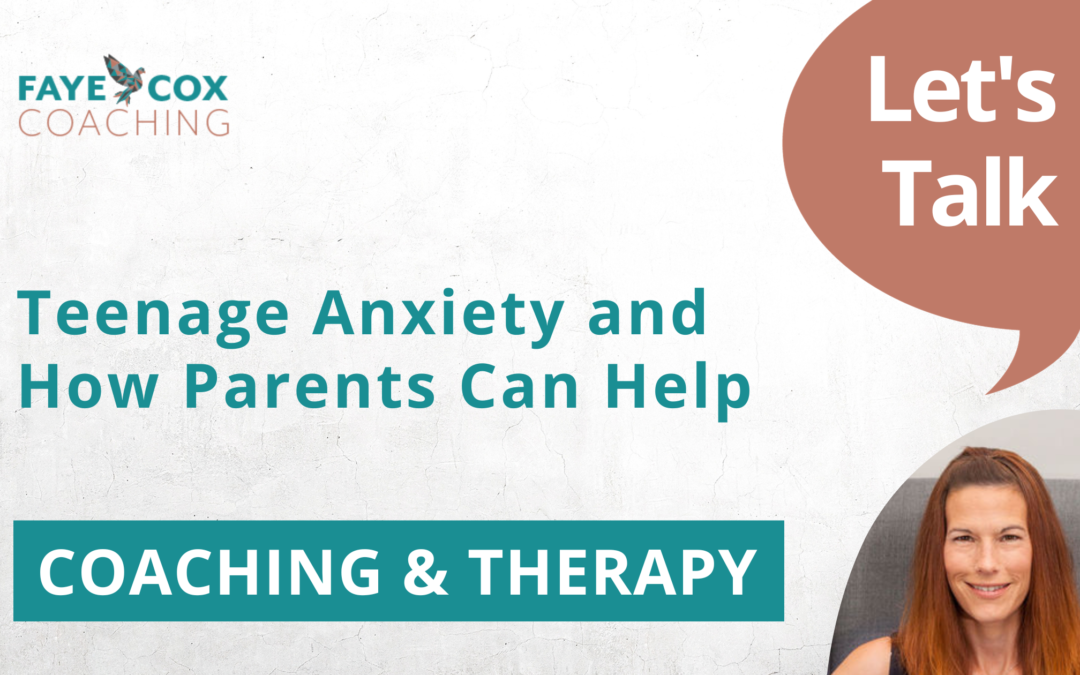
by Faye Cox | Sep 26, 2023 | Anxiety, Coaching, NLP, Parents, Stress, Teens, Wellbeing
What is Anxiety?
Everyone experiences feelings of worry from time to time. In fact worry is a natural response to the pressure of daily life and its our brains way of letting us know that something needs our attention. We can actually use our worry to our advantage when we’re doing something that we’re passionate about or something that is of risk, but that is a positive and calculated one.
In today’s hectic and constantly busy world it’s no surprise that people are experiencing more worry. Mainstream and social media play a big part in today’s constant feeling that a threat is just around every corner. The fact that our children and young people are increasingly more exposed to ‘perceived’ danger can become all consuming for their underdeveloped brains to cope with.
As humans we are conditioned to look out for threats, just as we did in the caveman days when the biggest threat was being attacked by a bear. As we’ve evolved our brains are still programmed to look out for the ‘Bear’, only 9 times out of 10 there isn’t one, but our minds cannot tell the difference between a perceived threat and a real one so we can become overly worried about something that isn’t real even though it emotionally and physically feels like it is. The good thing here is that we can use that to change the way we think of things and enable us to thank the bear for coming to keep us safe, but that he’s not actually needed here and can move aside.

Signs of Child and Teenage Anxiety
As parents it can be difficult to spot the signs of child and teenage anxiety so here are the most common:
- Lack of eye contact (this is a sign that they are shutting down emotionally)
- Shoulder shrugging when being spoken to (this is a sign that the brain is overwhelmed)
- Inability to focus (due to the anxiety becoming all consuming)
- Headaches and stomach aches (these are physical symptoms that anxiety is present)
- Tiredness (another sign that they are shutting down emotionally and physically)
- Feelings of sadness (due to not being able to understand what’s happening)
- Challenging behaviour (down to them not having the skills yet to communicate their fears)
- Rudeness (the logic part of the brain has gone off line and again they are struggling to understand and communicate their fears)
- Panic attacks (this happens when they can no longer control the physical and emotional symptoms and their anxiety has fully taken over)

The Fight, Flight, Freeze response
The above signs are a result of your child or young person entering what we call the ‘fight, flight, freeze response’ (FFF for short). Becoming aware of which response is their go to one, can be incredibly useful to both you and them. Becoming aware of your own is also key for you being able to regulate yourself when things get tough for your child or young person.
For simplicity let’s use the example of the BEAR in terms of how you deal with it when each of the FFF responses are switched on.
Fight – Speaks for itself really as you will want to fight the bear when this response is triggered
Flight – Again it’s quite self explanatory as when this response is switched on you will want to run from the BEAR
Freeze – In this response you will want to hide from the BEAR. Like a chameleon, you may want to blend in and disguise yourself so the bear can’t see you.
It’s very natural to enter all 3 responses. For example, you may initially fight and then freeze, or fight and then flee, or flee and then freeze. However, we tend to have an initial go to response in the first instance which is a tell tale sign that the response has been triggered.
In terms of school, this can lead to avoidance of either people, places or situations that are triggering one of these responses.

What can parents do to help Teenage Anxiety?
Another difficulty for parents can be that their child or young person may not be able to express how they feel. Parents need to feel comfortable really listening to what is being said and to remain curious when speaking to their child or young person about their feelings. Parents also need to know how to model healthy regulation of their own emotions which can be hard for some, particularly if this wasn’t modelled for them as a child.
When a young person reaches secondary school age they may be able to recognise their own feelings, but are still unable or unwilling to discuss them. The human brain is not fully developed until around 25 years of age and up until that point we live primarily in our emotional brain, and when our young people hit puberty there is a development surge in the brain which can cause A LOT of big emotions that as adults we see as over-reacting, but to our young people this is very REAL and often a scary and confusing time.
Allowing a space for your child or young person to turn to where they know they will be fully seen and heard is incredibly powerful. They don’t always want you to fix their worries. Quite often they just want you to sit in their worry with them for a while whilst they work it out for themselves.
If you found this article and teenage anxiety helpful you may like to visit the online shop or digital download pages on the website for more helpful resources to further support your child or teenager with anxiety.

by Faye Cox | Nov 17, 2020 | Uncategorized
Recently, I have suffered with a strong bout of anxiety. Due to a couple of events happening that have been accumulating to create the anxiety I experienced. Most people who generally don’t suffer with anxiety or recognise their own anxiety think that anxiety looks like chaos. They think it tends to be when people are acting chaotic, all over the place and up in the air or loud, but this is so often, not the case at all.
There are those who suffer and it shows externally and those who suffer and become withdrawn as a result and hide it internally.
When there’s too much going on
For me, there has been a lot going on recently with family, running a business, working with vulnerable teenagers, being a mum, being a wife and juggling the whole thing. Over the last month, I’ve been up and down from the hospital to see my dad who had major surgery. The journey to the hospital was an hour and then another hour back. My visiting times, a couple of hours at a time two or three times a week. This has been both mentally and physically exhausting. Even though you don’t think about it at the time, you get on with it and do what you’ve got to do.
On top of that, I’ve been trying to keep things as normal as possible. I’ve been doing a huge amount of work on myself and I have been investing in myself and my business heavily since the beginning of this year.
Working with vulnerable teenagers
I’ve been working with vulnerable teenagers since last September and sometimes that can be very challenging, although extremely rewarding. In the last month things have started to really get on top of me. My self-care hasn’t been as good as it should be, because I’ve been working on so many other areas.
Well this week. My dad came out of hospital after a month and the relief, as you can imagine, brought its own anxieties and emotions. Along with that, I made a mistake at the college, which ordinarily in isolation wasn’t that bad, but where everything else has been going on my mind decided to take this mistake, blow it massively out of proportion, get myself in a place where I was in tears. I got really emotional about it and couldn’t see the wood for the trees.
I went into college the next day, and I totally withdrew. I’ve taken time to recognise the fact that I was in this place of anxiety and to recognise how my anxiety affects me and how I deal with it around others. This is the first time I have fully been aware of my behaviour when in a state of anxiety, but as a result I can deal with it better using the techniques and strategies I have in my Coaching and CBT toolbox.
Recognising my own anxiety behaviours
I realised that I totally withdraw. I become very quiet, loud noise is something that I just can’t deal with. I can’t tolerate people talking about other people or bragging about themselves. I get super sensitive and I totally shut down anything external whilst I’m dealing with what’s going on inside my head.
Now this used to last for weeks or months until I worked out my own strategies for dealing with it. I now use the ‘accept, allow and let go’ strategy.
Firstly, I accept that I’m in this emotion and I have this feeling and this is what’s going on. I don’t try and fight it anymore. I accept it. I then allow myself. 24, hours to have the feeling, be comfortable with the feeling and work out how to separate the facts of what’s happened from the emotions I’m feeling.
After I’ve done that, I then make sure I go and do something for myself, whether it’s going to the gym and going for a run. I find running is great for me It just gets rid of all that negative energy.
Sometimes it’s whilst I’m running and sometimes it’s after, and if there is something particularly going on I will cry for the next few days for what feels like no reason at all, but this is my body’s way of getting rid of all the negative energy that I’ve been storing up.
After that. I’m ready to go again. And by doing that, I am able to let go so much quicker than I used to.
Talking about the taboo
If I’m completely honest, If you’d asked me years ago if I suffered from anxiety I would have told you DEFINITELY NOT. I never would have admitted that I suffered from anything let alone something that people consider a taboo subject.
I truly believe that everybody suffers with anxiety, at some point, in some form, to some level. It’s just whether we recognise that that’s what it is, whether we’re ready to accept it, and whether we’re ready to put the strategies in place in order for us to manage these feelings and be able to deal with them and move forward.
So, with that in mind, please remember that somebody may be suffering right now. Somebody may have withdrawn. Somebody may be very quiet. Somebody may be the complete opposite. Because the opposite to that is that somebody may become louder than usual. They may become more erratic. You may feel like they’re just seeking attention. This is all part of how they’re feeling and how their anxiety may have taken hold. Some people feel a stronger need for control, as they don’t feel in control of their thoughts and emotions, so they project externally on to others.
They may not even recognise that’s what’s happening to them. So be kind. If somebody that you know, somebody you work with, live with, are friends with is showing either of these signs or emotions, just check in with them. Find out if they’re OK. Offer them someone to talk to.
I had somebody at the college this week, who I get along very well with, we understand each other really well and we know when something’s not quite right and she’s been amazing. This week, she’s checked in on me. She’s made sure I’m OK. She’s given me a bit of a talking to. The same talking to the I would give her if she was in the same situation.
We all need support
We all need support and sometimes that support comes from people that you don’t necessarily expect it to straight away.
We all need to look after each other, be more open with our own feelings and what we’re going through, because you will be surprised where that support may come from.
If you feel like you might need help with anxiety, if you need some strategies and techniques to help you manage it, I’m always happy to have a chat.
I offer a 30-minute clarity call where I can give you a strategy straight away to help you begin to manage those more difficult days.
Please don’t suffer in silence.
Book your call here

by Faye Cox | Mar 16, 2020 | Uncategorized
Some people have a difficult time in managing their anxieties and fears. In addition, a person’s self-esteem and self-confidence can also suffer. As a result, here is a list of techniques a person can use to help manage their anxieties, fears, and self-esteem.
Remember that practice makes perfect. Whenever it comes to dealing with your anxieties or any other task; practice, patience, and persistence is the name of the game. If you don’t get the desired results the first time around, then keep trying until you do. Through practice, you will become better at the task at hand and your self-confidence will increase. This also applies to managing your anxieties.
In every anxiety-related situation you experience, begin to learn what works, what doesn’t work, and what you need to improve on in managing your fears and anxieties. For instance, you have a lot of anxiety and you decide to take a walk to help you feel better. The next time you feel anxious you can remind yourself that you got through it the last time by taking a walk. This will give you the confidence to manage your anxiety the next time around.
Sometimes, we can get anxious over a task that we will have to perform in the near future. When this happens, visualise yourself doing the task in your mind. For instance, you and your team have to play in the championship volleyball game in front of a large group of people in the next few days. Before the big day comes, imagine yourself playing the game in your mind. Imagine that you’re playing in front of a large audience. By playing the game in your mind, you will be better prepared to perform for real when the time comes. Self-Visualisation is a great way to reduce the fear and stress of a coming situation and increase your self-confidence.
Don’t forget to ask for help when needed. A person can only do so much. Asking for help can give us additional resources to help manage our fears and self-confidence. It is not always easy, however as humans, we thrive on being asked to help others and if you ask the right people it will lighten the load. Remember the old saying ‘a problem shared is a problem halved’.
Write down on a list everything that you are thankful for. Do not take anything for granted. The next time you feel down, take out your list and review everything that you have listed. This is a great way to remind us of what we have when we lose sight of the good things.
It can be difficult to manage our anxieties and self-esteem. If you are having trouble despite asking for help from friends and family etc. then talk to a professional who can help you manage your fears, anxieties and self-esteem. They will be able to provide you with additional advice, techniques, tools and insights on how to deal with your current problem. In the meantime, remember to take it one day at a time.
You can book a FREE 30 minute clarity call with me to see how I may be able to help






